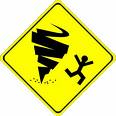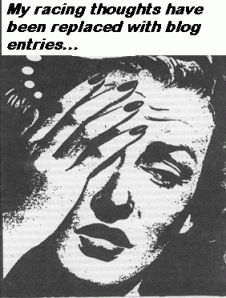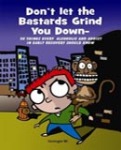 In early recovery, I was angry, bitter, confused and stark raving mad but knowing that now didn’t help me much then.
In early recovery, I was angry, bitter, confused and stark raving mad but knowing that now didn’t help me much then.
Sometimes, a simple saying that I heard in a Twelve Step meeting might set me off, quotes like ‘stinkin thinkin’ for instance. Whenever I heard this I’d imagine myself as a cartoon character from Looney Tunes, Wile E. Coyote sticking dynamite in his ears and Road Runner lighting the fuse. I didn’t want to hear it! It really bugged the shit out of me – stinking thinking? I stink not!
Another thing I heard said often was this zinger: “It’s easy to stop drinking, it’s staying stopped that’s hard”, hearing that one sent the barometer in my brain shooting through the top of my head. The first thing that came to mind was, “If it was so fucking easy to stop drinking why are all you nut jobs sitting in this room talking about it? Shouldn’t you be getting on with your perfect alcohol free lives and leaving us losers to it? In fact, hearing this made me think I was in the wrong place or at least the wrong meeting; all these folks obviously didn’t have a problem like mine, because it seemed that when they wanted to stop drinking, they just stopped!
I couldn’t relate at all because once I started drinking I couldn’t stop until I passed out. When I came to, either the next day or in a few hours, I’d start drinking again immediately to block out the guilt, dread and eventual withdrawal symptoms. In fact I’d only stop when my body physically rejected the alcohol. Whenever this happened – which was often – I’d take sips, throw up, take more sips, throw up until somewhere along the way I’d pass out in a pool of puke. That was how I stopped drinking; it wasn’t because it was easy, it was because I had lost control over my bodily functions.
Another saying I heard was, “Stick around for the miracle to happen” – Hmm, I’d hardly say any of the people I saw in those meetings qualified for the Vatican’s ‘Call-in a miracle line”. Nope, I didn’t see any miracles going on there and definitely no images of religious icons in the tossed out coffee filters. Thankfully, I was desperate enough to want to know why these people stuck around, why did they quote all these useless sayings and why did some of them look so happy? At first I thought it was because they came to gloat, “Look at me, you poor bastards, I don’t have a drinking problem and you do”.
Turns out, I was more like Wile W. Coyote than I realized because no matter how much he got hurt, blown up or tossed into a bottomless canyon in his attempts to catch the Road Runner, he always tried again, trying the same thing over and over and expecting different results. That is exactly what I did with my drinking, I drank and drank, hoping that this time, I could just have one drink and stop, or this time I could control my drinking and drink like other people.
Thank God I stuck around and took the dynamite out of my ears and starting listening. I realized what these people were actually saying was that it wasn’t necessarily easy to stop drinking, it was just a little easier than staying stopped. Because the truth is, most of us will swear off the booze time and time again only to pick it up a day, week, month or even a year later. I was one of these people, and the only thing that stopped this nightmare cycle for me was to commit to a program of recovery and in my case it was Alcoholics Anonymous.
After a few months in AA, the sayings didn’t bother me as much, if people got something out of them and they stayed off the sauce for another day, who was I to judge? Plus I began to see the miracles they were talking about, whether it was someone opening up and sharing for the first time or a milestone celebrated by someone who was clearly a different person than they were when they first walked into the rooms. And yet another saying I heard began to ring true whereas before when I heard it, I almost lost the plot completely. This I had heard many times, “There’s good news and bad news, the good news is there is a solution to your problem, the bad news is, we are the solution”.
They were right about that one too.
 My Sponsee has gone off the radar, I’ve not heard from her in 2 weeks. She was working on the 4th Step – although ‘working’ might not be the right word, I think balking might be more fitting. I’ve tried to call her, but she’s not returning my calls.
My Sponsee has gone off the radar, I’ve not heard from her in 2 weeks. She was working on the 4th Step – although ‘working’ might not be the right word, I think balking might be more fitting. I’ve tried to call her, but she’s not returning my calls. Like most of us and definitely for me, the road to recovery was a long one and along the way I always had a feeling of being ‘less than’ and it only intensified with every failed attempt. I didn’t believe that I could get sober, in fact the only thing I believed without a shadow of a doubt was that I was going to die a drunk.
Like most of us and definitely for me, the road to recovery was a long one and along the way I always had a feeling of being ‘less than’ and it only intensified with every failed attempt. I didn’t believe that I could get sober, in fact the only thing I believed without a shadow of a doubt was that I was going to die a drunk.  There were a lot of things that I used as a reason to keep me from quitting drinking and one of them was the guilt from the way I had treated my friends and family during my drinking years. I lost many friends and damaged relationships with people that I thought could never be mended. One person that I had hurt immensely was my best friend; in fact, just thinking about how I’d behaved would cause me to reach for the bottle.
There were a lot of things that I used as a reason to keep me from quitting drinking and one of them was the guilt from the way I had treated my friends and family during my drinking years. I lost many friends and damaged relationships with people that I thought could never be mended. One person that I had hurt immensely was my best friend; in fact, just thinking about how I’d behaved would cause me to reach for the bottle.  Working with my sponsee, who has almost 70 days sober, I’m reminded of how frustrating early sobriety can be. Things were going along fine; we were working on the Third Step, when out of the blue she received a letter from a family member that got her all twisted up.
Working with my sponsee, who has almost 70 days sober, I’m reminded of how frustrating early sobriety can be. Things were going along fine; we were working on the Third Step, when out of the blue she received a letter from a family member that got her all twisted up. As a newcomer, I recall sitting in a recovery meeting and hearing someone say, “No matter what happens, you don’t have to pick up a drink or drug today.”
As a newcomer, I recall sitting in a recovery meeting and hearing someone say, “No matter what happens, you don’t have to pick up a drink or drug today.” To me, the saying that someone is ‘stuck between a rock and a hard place’ sums up perfectly my addiction to alcohol because I couldn’t live with it and couldn’t ever imagine a life without it.
To me, the saying that someone is ‘stuck between a rock and a hard place’ sums up perfectly my addiction to alcohol because I couldn’t live with it and couldn’t ever imagine a life without it.
 I’m a chronic alcoholic who relapsed over and over. I had enough 1, 2 and 3 month sobriety chips to tile my bathroom. After every relapse and my sheepish return to AA, the first thing I’d hear was, “Are you done now?”
I’m a chronic alcoholic who relapsed over and over. I had enough 1, 2 and 3 month sobriety chips to tile my bathroom. After every relapse and my sheepish return to AA, the first thing I’d hear was, “Are you done now?”